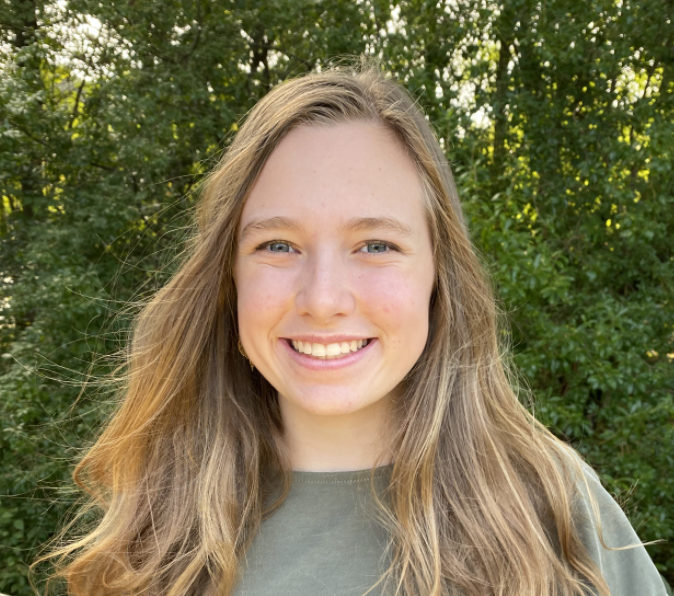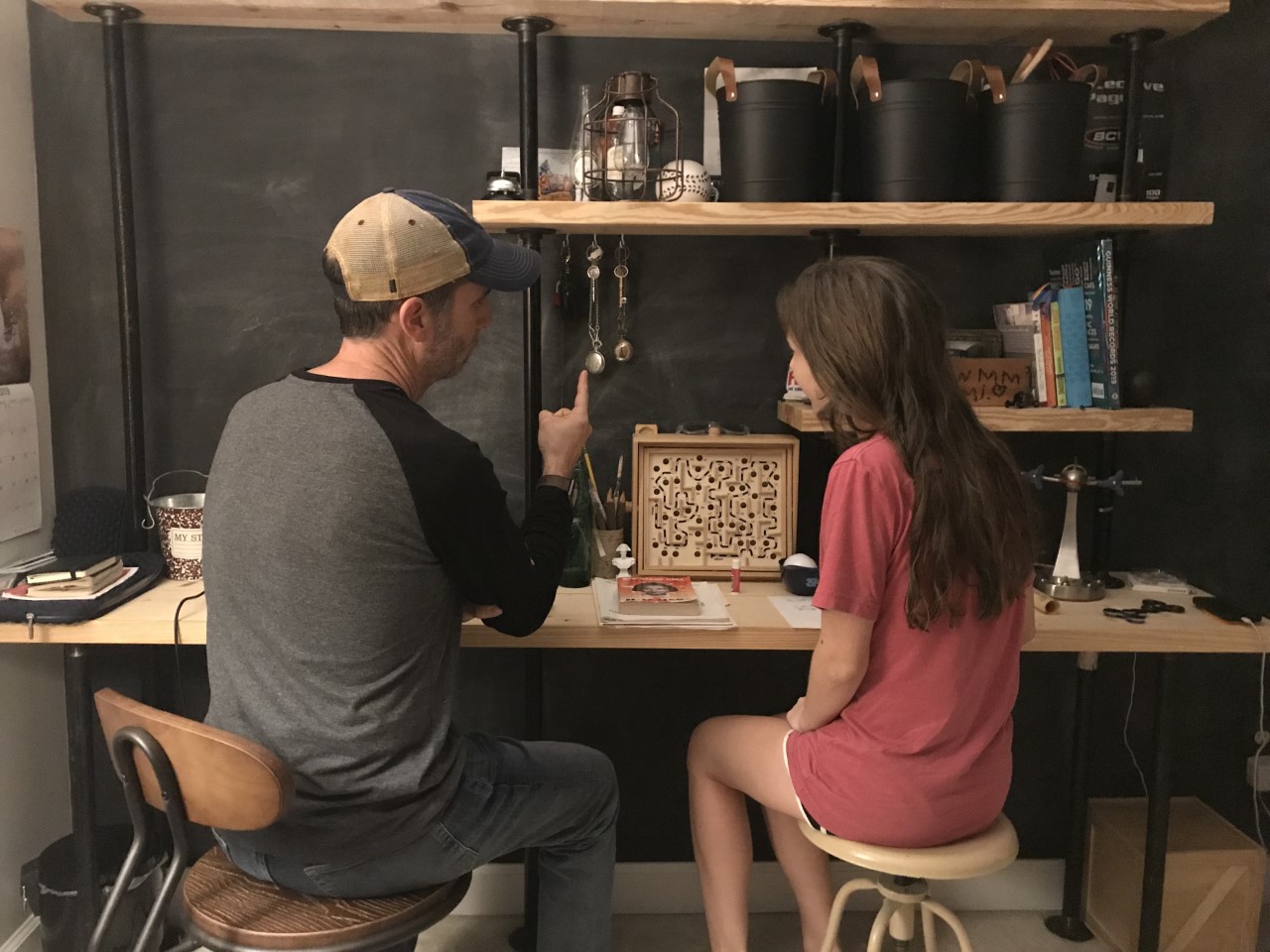The older and younger generations converse on a daily basis, but does the difference in slang change the meaning of the conversation? (Photo courtesy Abigail Mabe)
Slang, prevalent throughout all previous decades, continues to influence our current vocabulary. The English language is constantly changing, which in turn welcomes English fluency and normality.
Slang should be welcomed as a transition between the English of the past with the modern English of today.
In the 1960s, slang such as ‘neato’, ‘sock it to me’, and ‘don’t flip your wig’ described phrases and different meanings of expression. We don’t use these expressions anymore; instead, the english language has changed to integrate some of the ‘60s slang and to drop the others.
Some of the ‘60s slang that is still common today includes ‘tuff’ to describe things that are literally tough and ‘shotgun’ to describe the passenger side of the car. Sometimes just the meaning of the word changes. An example of this is ‘blast’, where in the ‘60s it meant a loud party but in the current decade, ‘blast’ is used in an expression like ‘I gotta blast’, meaning “I have to go”.
Some older slang that has fizzled out through generations is ‘bad’, which typically means awesome. It began in the ‘60s and continued throughout the ‘90s before it lost momentum and we no longer use ‘bad’ to express our feelings about something great.
We can look at the slang in the ‘60s and link it to the culture of the time, which is often viewed as a “hippie” sort of time period. Many people living in the ‘60s used the word ‘groovy’ to explain something ‘outta sight’ and cool. These words and others like ‘righteous’ and ‘twitchin’ classify the ‘60s as a bohemian decade.
In the 1970’s, America took change by the hand, changing music, social norms, and of course slang. ‘70s slang is more prevalent in current times than the ‘60s, as words like ‘psych’ (meaning to fool someone) and ‘chill pill’ (meaning to calm down) are still used with the same meaning.
The ‘70s slang also took a more literal meaning than most other decades, with expressions such as ‘right on!’ to express agreement or ‘do me a solid’ to ask someone for a favor.
One of the favorite expressions used in the ‘70s that has found its way into many TV shows and movies is ‘cool beans’, which shows the importance of slang in the past and its impact on current media. The 2007 movie Hot Rod uses ‘cool beans’ as one of its catchphrase lines, and the character Creed in “The Office” also uses ‘cool beans’.
The 1980s brought on the era of superlatives. With superlatives describing every experience with words such as ‘bad’ and ‘wicked’, there were also classifications of people such as the “valley girl”, the modern-day “vsco girl”.
The common word ‘psych’ and common phrase ‘take a chill pill’ from the 1970s is also prevalent in this decade. The word ‘righteous’ skipped passed the ‘70s slang, originating in the ‘60s, and continuing into the ‘80s.
The ‘80s are often thought of as the surfer-type decade, framed by the word choices like ‘groovy’, ‘bod’, and ‘gnarly’ that we now classify as surfer speech.
Some common words and phrases we use currently from the ‘80s are ‘like’, ‘I’m sure’ and ‘totally’, showing continuity from all these decades into our modern word use that is no longer slang to us, but common speech.
“[I used words like] ‘word up’, ‘wicked’, and ‘peace out’ [when I was in high school],” said Jennifer and Sammy Caraballo, Leesville High School parents speak about the ‘80s.
“Wicked, totally awesome, like oh my god [were phrases I commonly used in High School],” said Alicia Comeskey, another Leesville High School parent speaking about the ‘80s.
The ‘90s gave way to popular pop culture movies and shows that are commonly used as a form of entertainment in the modern decade. Some of these movies are Titanic and Jurassic Park. The slang of this decade reflects the turn towards modern language and speech through this newfound pop culture.
You will see commonly used language in the 2010s reflect ‘90s slang more than other decades such as ‘dip’ in ‘let’s dip’ (let’s leave). Also, ‘oh snap!’ is commonly used among teenagers in the modern era if tensions rise between groups or people, and the same for the ‘90s.
The modern decade closely reflects the ‘90s in how we regularly speak with other words such as ‘tattletale’ which people often use to describe their siblings or someone telling on them to a superior. Another example is ‘dibs,’ as in we call dibs to get shotgun in a car or who gets the last slice of pizza. ‘Props’ gives people “proper respect”, but you can now hear this phrase often after a speech, giving props to teachers or parents.
“I hear people say ‘totally awesome’,” said Comeskey.
This slang from previous decades shapes our modern daily speech, as it is no longer classified as “slang”. Slang is important to develop the English language and speech, as the English language is constantly changing and flowing through generations. We can see this through continuity in speech all the way back to the ‘60s and throughout the ‘90s.
“[I believe slang is] not good but it’s not bad,” said Caraballo.
“I think [slang] is good because it gives teenagers their own way of expressing themselves,” said Comeskey.
Teenage slang such as ‘no cap’ and ‘tuff’ encourage the development of the English language and should continue to be celebrated as a form of expression.
The links below give a deeper insight into the slang from each decade from the ‘60s on.
The 1960s: https://grammar.yourdictionary.com/slang/1960s-slang.html
The 1970s: https://groovyhistory.com/best-slang-words-70s
The 1980s: http://www.liketotally80s.com/2009/05/80s-slang/
The 1990s: https://www.dictionary.com/e/s/nineties-words/#hella-cool

Hi! My name is Abigail and I am a senior editor for The Mycenaean. I am also a member of Leesville’s cross country team and track team, as well as the president of National Technical Honor Society.

Leave a Reply